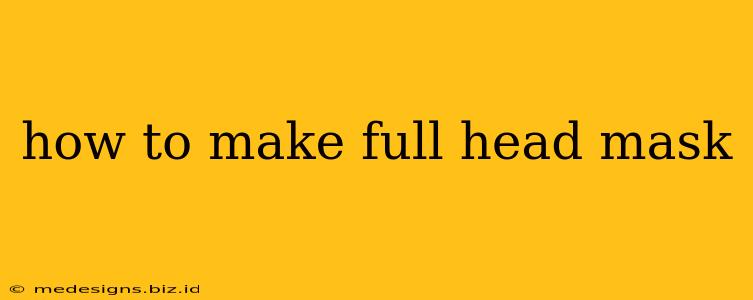Making a full head mask can be a fun and rewarding craft project, perfect for costumes, cosplay, or theatrical productions. This guide will walk you through creating your own, whether you prefer a simple or more elaborate design. We'll cover various materials and techniques to help you achieve your desired look.
Choosing Your Materials: The Foundation of Your Mask
The materials you choose will significantly impact the final look and feel of your full head mask. Consider these options:
For Beginners:
- Paper Mache: This classic method is inexpensive and relatively easy. You'll need balloons (to create the base form), newspaper strips, wallpaper paste, and paint. This technique allows for a lightweight, customizable mask.
- Felt: Felt is a great choice for a softer, more comfortable mask. It's easy to cut and sew, making it ideal for beginners. Consider using a thicker felt for more durability.
- Craft Foam: Similar to felt, craft foam is readily available, easy to work with, and comes in various colors and thicknesses. It's lightweight and can be glued or stitched together.
For Intermediate/Advanced Crafters:
- Latex: Latex offers a more realistic and detailed finish but requires more skill and specialized tools. It requires careful molding and painting techniques.
- Resin: Resin allows for intricate details and a durable, long-lasting mask. However, it involves working with potentially hazardous materials and requires a good understanding of resin casting techniques.
- 3D Printing: If you have access to a 3D printer and design software, you can create a highly customized and precise full head mask. This requires digital design skills and the appropriate equipment.
Step-by-Step Guide (Paper Mache Method):
This method provides a great starting point for beginners.
1. Create the Base: Inflate a balloon to the desired size of your head. Secure the knot tightly.
2. Prepare the Papier Mache: Tear newspaper into strips approximately 1-2 inches wide. Mix wallpaper paste according to the package directions.
3. Apply the Papier Mache: Dip the newspaper strips into the paste and carefully apply them to the balloon, overlapping each layer. Build up several layers for strength and durability (at least 4-5 layers). Allow each layer to dry completely before adding the next.
4. Let it Dry Completely: This is crucial. A completely dry mask will be much easier to work with and less prone to cracking. This can take several hours or even a day.
5. Remove the Balloon: Once completely dry, carefully pop the balloon and remove it from inside the mask. You might need to gently widen the opening.
6. Refine and Shape: You can use additional papier mache to fill any gaps or imperfections.
7. Painting and Detailing: Once dry, paint your mask with acrylic paints. Get creative with details like eyes, a mouth, hair, and any other features you desire. You can add texture using various painting techniques.
8. Finishing Touches: Seal your mask with a sealant to protect the paint and add durability. You might also consider adding accessories like feathers, fabrics, or other embellishments.
Tips for Success:
- Patience is Key: Creating a full head mask takes time and patience. Don't rush the process.
- Ventilation is Important: When working with potentially hazardous materials like latex or resin, ensure proper ventilation.
- Practice Makes Perfect: Don't be discouraged if your first attempt isn't perfect. Learn from your mistakes and keep practicing.
- Research Different Techniques: Explore various tutorials and guides online to expand your knowledge and find inspiration.
With the right materials and a little creativity, you can craft a truly unique and impressive full head mask. Remember to have fun and let your imagination run wild!
